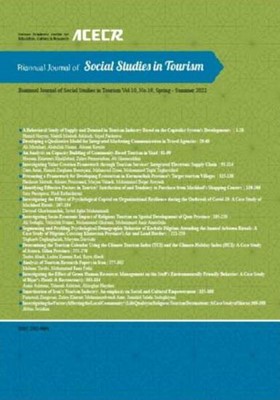An Analysis on Capacity Building of Community-Based Tourism in Yazd
Subject Areas :Hosein Kalantari 1 , Zahra Pirmoradian 2 , Ali Shamsuddini 3
1 - Prof. of Institute of Humanities and Social Studies, ACECR
2 -
3 -
Keywords: Tourism, Capacity Building, Community-Based, Yazd City,
Abstract :
The tourism industry, with its own characteristics, is a dynamic industry with a bright future. Investing in this industry could play an important role in increasing national income while being free from adverse environmental consequences. Due to the increasing importance of tourism, it is necessary to analyze its impact on other dimensions. Possessing special potentials, the Yazd city is highly affected by different economic, social, environmental, and physical aspects of the tourism industry. As the Yazd province enjoys the required capacities for performing activities such as climbing, visiting the sand dunes and sand flows, hiking in the slopes of Shirkouh, etc., effective steps can be taken for improving tourist attractions through accurate and well-reflected planning. Therefore, this study sought to identify relevant factors, strengths, weaknesses, opportunities, and threats involved in developing sustainable tourism, elaborating on an appropriate model for realizing this goal and analyzing a community-based tourism capacity building in Yazd. The required data for this "descriptive-analytical" study were collected from library studies, relevant documents, and the questionnaire administered on 50 experts and staff members of active tourism NGOs, which were analyzed and weighted using the SWOT-AHP integrated model. The investigated indices included attracting public participation (public mobilization) with a total average of 4/4, facilitating (offering information), institutionalizing and empowering local groups with a total average of 4/3, enhancing collective partnership system with a total average of 4/2, identifying entrepreneurship and job opportunities, and local needs analysis and its update, indicating that tourism NGOs possess high capacities for implementing community-based tourism in Yazd.
جهانگیری، جهانگیر، معینی، محمد (1390)، «بررسی هویت اجتماعی و ملی ، مطالعه موردی: دانشگاه شیراز»، مجله علوم اجتماعی ادبیات و علوم انسانی، دانشگاه فردوسی، شماره 2: 47-32.
حاتمی¬نژاد، حسین، پرهیز، فریاد و مهرداد کرمی (1392)، «تحلیلی بر ظرفیت¬سازی گردشگری اجتماع¬محور»، مجله سپهر، دوره بیست و یکم، شماره 82: 13-7.
حاتمی¬نژاد، حسین و شریفی، امیر (1394)، «بررسی نقش گردشگری شهری بر توسعه¬ی پایدار شهری (نمونه موردی: شهر سنندج)»، گردشگری شهری، دوره 2، شماره 1: 74-61.
حایریان اردکانی، محمود (1386)، مطالعات توسعه اقتصادی اجتماعی و فرهنگی شهرستان یزد، جلد اول، استانداری یزد.
سازمان مدیریت و برنامه¬ریزی استان یزد (1395)، سالنامه آماری استان یزد.
ضیایی، محمود و عباسی، دیاکو (1397)، «چالش¬ها و رویکردهای توسعه ی گردشگری پایدار: از نظریه تا عمل»، مجله برنامه¬ریزی و توسعه گردشگری، سال هفتم، شماره 24: 37-8.
عیدگاهیان¬کاسب، ندا و مژگان عظیمی¬هاشمی (1397)، «سرمایه اجتماعی و وفاداری زائران اصفهانی به محله سرشور مشهد»، فصلنامه مطالعات اجتماعی گردشگری، سال ششم، شماره 12: 70-47.
فاضل¬بخششی، فرشته (1390)، «گردشگری جامعه¬محور، راهکاری جهت توسعه پایدار گردشگری در ایران»، همایش مرکز گردشگری علمی- فرهنگی دانشجویان ایران.
قره¬نژاد، حسن(139 7)، صنعت گردشگری و تحلیل¬های اقتصادی آن، انتشارات دانشگاه آزاد اسلامی واحد نجف آباد.
كاظمي، مهدي (1385)، مديريت گردشگري. تهران: سمت.
کاظمیان، غلامرضا، آزادی، الهام (1390)، «الگوی توسعه گردشگری شهری در مرکز شهر تهران با رویکرد مدیریت شهری»، فصلنامه مطالعات گردشگری، شماره 15: 83-53.
کیانی¬سلمی، صدیقه، بسحاق، محمدرضا (1396)، «شناسایی اثرات گردشگری و نقش آن در توسعه شهری کاشان»، فصلنامه علمی- پژوهشی مطالعات شهری، شماره 25: 44-31.
نوعی، غلامحسین، ساجع، سارا (1390)، «نقش سازمان¬های غیردولتی (سمن¬ها) در توسعه پایدار»، همایش گردشگری و توسعه پایدار: 13-1.
فرهانی فرد، سعید، (1384)، «توسعه پایدار بر محور عدالت»، مجله اقتصاد اسلامی سال پنجم، شماره 19.
حبیبی، محسن، سعیدی، هادی، (1384)، «شهرسازي مشاركتي؛ كاوشي نظري در شرايط ايران»، مجله هنرهای زیبا، شماره 24، 17.
Forstner, K.(2004) Community ventures and access to markets: the role of inter marketing rural tourism products. Development Policy Review 22,497-514.
Ramchander, P (2004). Appropriate planning for tourism in destination
communities , university of Pretoria , South Africa.
Suansri,Potjana(2003). Community tourism hand book, REST foundation,Canada.
United Nations Development Program (UNDP), (2001), Human Development Report.
Making New Technologies Work for Human Development. Oxford University Press, New York.


